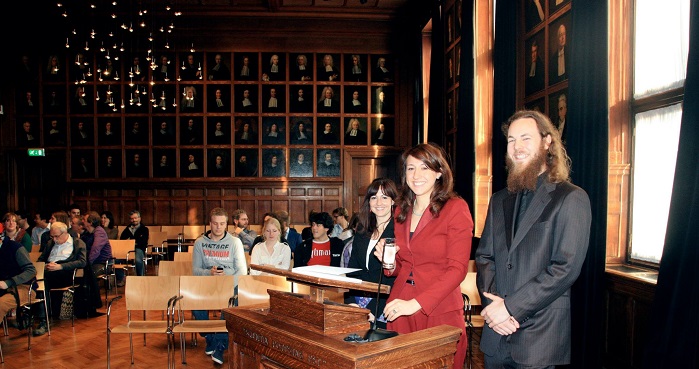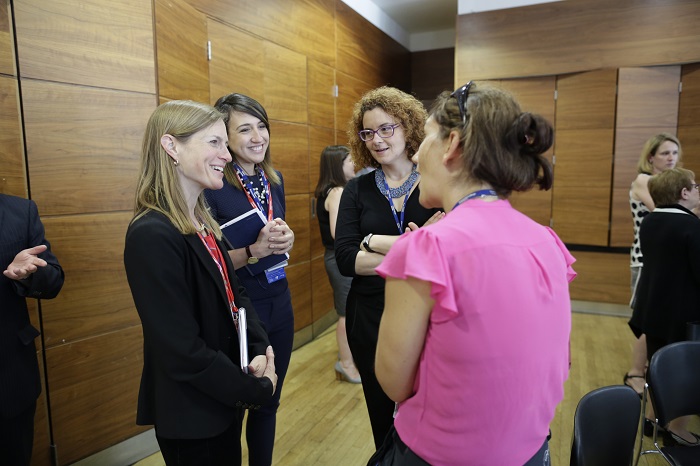Francesca Pietra
July 24, 2021 · 7 min read
Ex Novo – Science behind the scenes
“Ex Novo – Science behind the scenes” is a series of articles born within ISA’s blog in collaboration with the Collegio Nuovo – Fondazione Sandra e Enea Mattei in Pavia, whose students community is marked by a strong presence of women in science. Science is research, long hours to carry out experiments in the laboratory or in the field, but science is also communication, grant writing, entrepreneurship, administration, teaching, project management, leadership and many other facets. We will post articles, interviews and short stories on these multiple aspects of the scientific endeavour. Should you like to contribute with your experience, do not hesitate to get in touch with Michela, ISA’s Head and Collegio Nuovo Alumna, here: michela.bertero@crg.eu.
A matchmaker for industry and academia
I have always had a passion for science, learning how things work, how to be objective and how to reason and solve problems, so chemistry for me was a natural choice. I truly enjoyed my years on the typical University pathway (MSc, Ph.D., post-Doc…), I picked pure chemistry and then a specialisation in material science because I wanted to work on nanomaterial for medical applications. As I discovered more and more about the fascinating world of material science and all its possible applications, I got drawn towards the area of sustainable energy and how that could help fight one of the biggest challenges the world is facing: climate change.

Figure 1. Francesca´s PhD defence.
To follow that path, I packed my bags and flew over to the Netherlands for my doctoral studies. For 6 years, I worked on the development of materials that could be used to convert solar energy and later on materials for low-energy-consuming lighting solutions that could be incorporated into commercial devices, closely collaborating with Philips Research. A world leader in lighting solutions.
The work I did with the private sector gave me the possibility to experience a totally different approach to research, where the product is the driving force and dictates the research priorities. This joint experience between academia and industry made me understand how important such a collaboration is. In order to produce new and exciting scientific discoveries and technologies and to make a difference, it is pivotal to find a common ground between the more fundamental research (which often is carried out in Universities) and the product oriented view of industry, seeking to maximise joint value across activities in research.
I realised how important is to promote and foster those interactions, as this can be a direct way to impact and to fast-track the translation and implementation of academic research and discoveries in “real world” applications, helping to solve those challenges I was so passionate about. Was this maybe another way for me to contribute?
During this time working with Philips I used to talk of how I loved finding myself at the interface between academia and industry. I came to realise how this collaboration is the key to obtain important scientific breakthrough and create social and economic impact. This is true especially in the field of energy, which is strongly governed by economic and market demands. One day, one of my colleagues told me: “Why don’t you consider doing that as a job?” All of a sudden, something clicked in my brain, but I was not sure if it was the right choice for me and most importantly, I had no idea where to start. I did lots of research on those type of roles: did they exist? What did they involve? What skills did they require? …after a couple of months I was certain that was going to be my next step!
My experience so far had armed me with a strong scientific background, analytical skills and a problem-solving attitude, but also with a good understanding of how private firms work. This positioned me well to explore a new career path.
Today – more than 5 years after that “leap of faith”- I work as industry liaison and technology transfer professional for Imperial College London. I work with both businesses and academia focusing on engineering disciplines, supporting the development of strategic research collaborations and the commercialisation of technology via licencing or start-up formation. This means supporting researchers with early interactions to identify the problems and common areas of interest for both our academics and business partners; shape the research programme to ensure we can maximise value from both sides; support the academics in discussions related to costing, intellectual properties and contractual matters to ensure we protect academic freedom while allowing results to be translated and implemented by the industrial partners. This role is both external facing, acting as match-maker, understanding the businesses needs and challenges, and matching with the right experts in the college. As well as internal facing, advising the faculty on industry engagement, identifying the companies that work in areas that are interesting for our researchers, exploring options for collaborations, attract funding and help shape and progress initiatives which involve corporate partners.

Figure 2. Friendly academia-industry liaison meeting (Tech Foresight 2016).
As part of the role, I manage a broad project portfolio of partners and deliver collaborations in sectors including Energy utilities, IT, Automotive, Fintech, Engineering, Manufacturing, Aerospace, Food and Nutrition, Technology. Each year this includes securing collaborations with companies (including Small and Medium Enterprises) that have never worked with our researchers, or in some cases, a university before. New business partnerships are developed through identifying prospective new partners to target, marketing and outreach activities (for example market research of specific sectors to identify targets followed by cold-calling, networking at multiple events including business partnering conferences, and communication of material). Alternatively, where companies have a particular interest in working with university, they may contact the team directly, or via academics at Imperial who then reach out to the team.
Compared to my days in the lab, when I was devoting all my attention to a single project and research area, now I have to grasp many different topics and be able to describe them at various levels of complexity, ensuring I understand where the synergies are between the university capability and the business drives. This is incredibly interesting as I get to work on many different subjects, and I get to interact with and learned from world-leading scientists. This means every day I am learning new things about exciting novel and innovative research! No day is the same.
Do not get me wrong…I loved being a researcher: solving problems and finding creative ways of doing it, but the “problem” with science is…. if you want to confirm that what you have discovered actually solves that specific problem and that your amazing solution actually works… one lucky time is not enough and you need to repeat it and repeat it, change conditions and parameters until you have enough data to be able to say “yes this actually might work”. I still remember what a senior-scientist at Philips told me once: “a scientist needs to have high threshold of frustration and resilience and needs to reach it at least once a day”. That made me think I was not sure I wanted to do that every day for the rest of my life, and there could be another way to use those skills and my passion to contribute and support science breakthrough.
Now, I found a new way of applying those skills where I feel I can make a larger contribution while I keep learning every day. I will not hide it: the transition has not been easy and I had to learn many new skills like negotiating contracts, managing IP, dealing with multiples short deadline at any given time, and how to do this job almost from scratch, but I was lucky to work with amazing people and in a great environment that helped me strive. In this role, I found a renewed passion for science, and the hope that I am making a little, but meaningful, contribution to society.